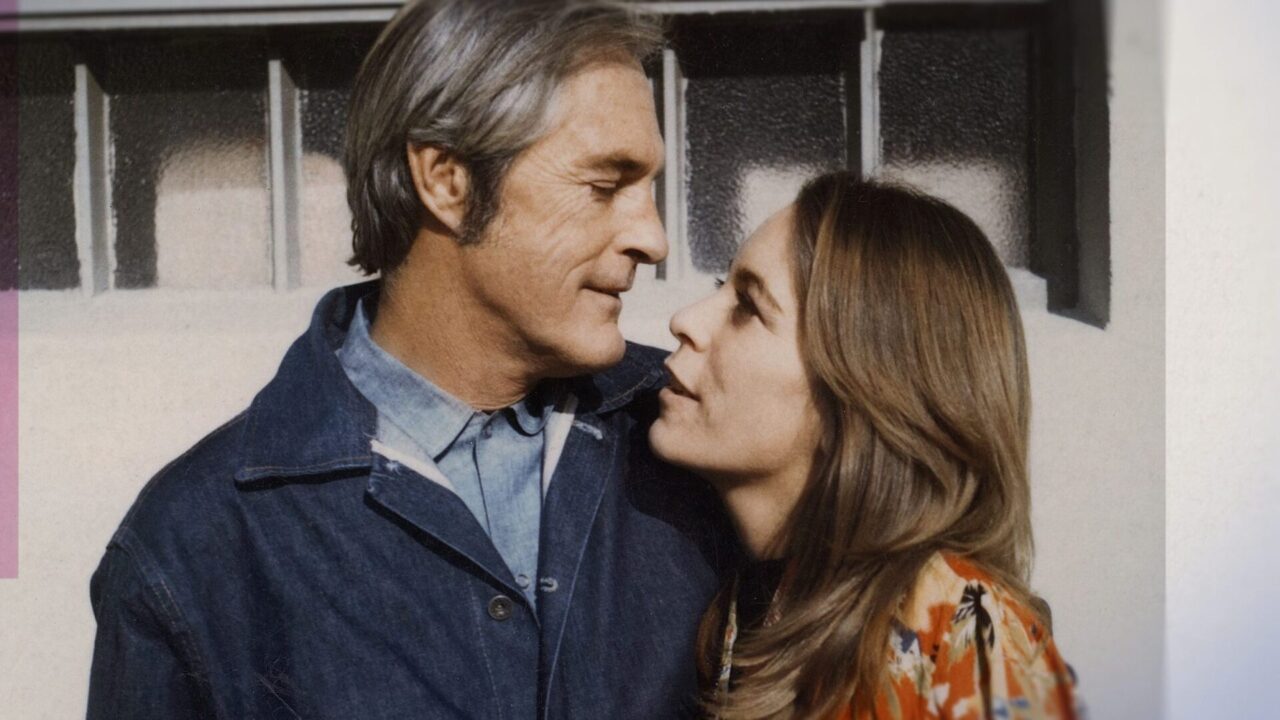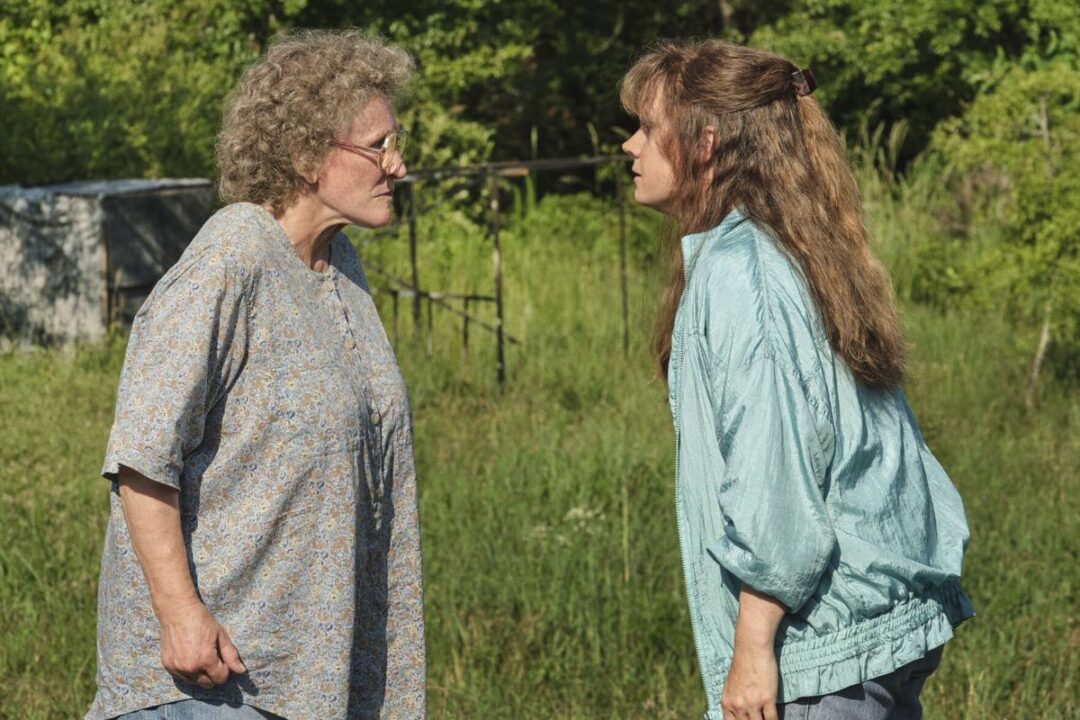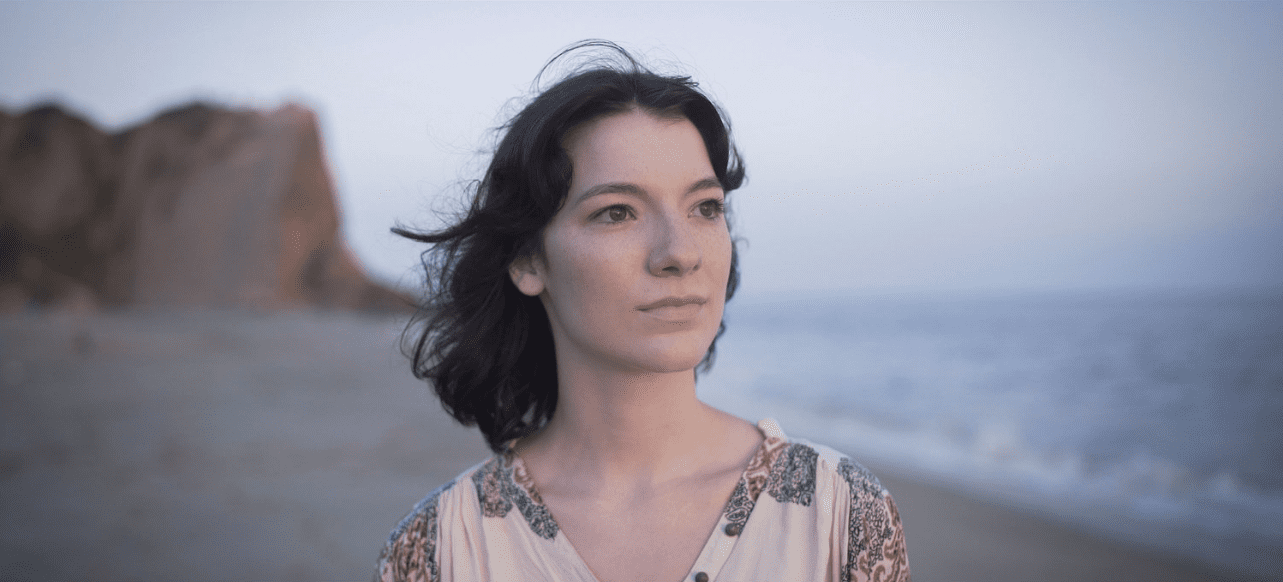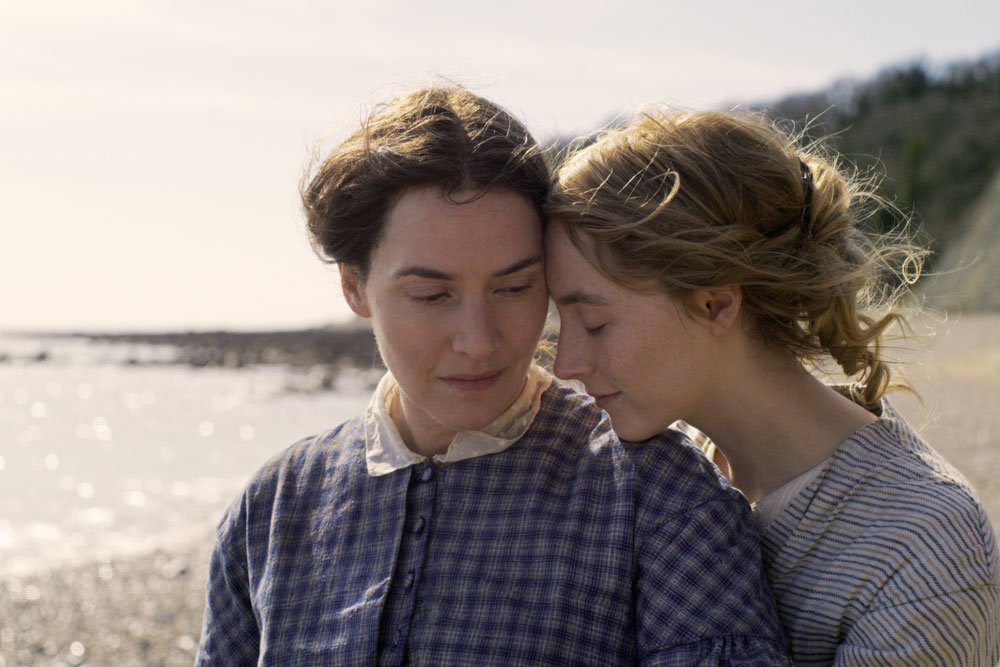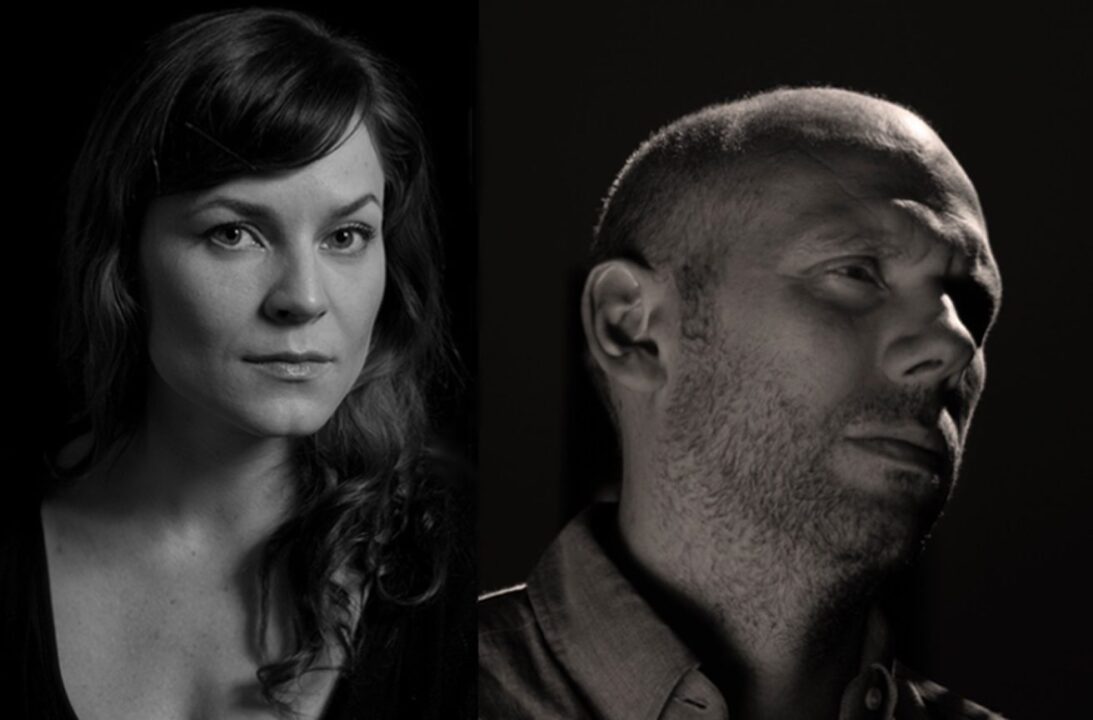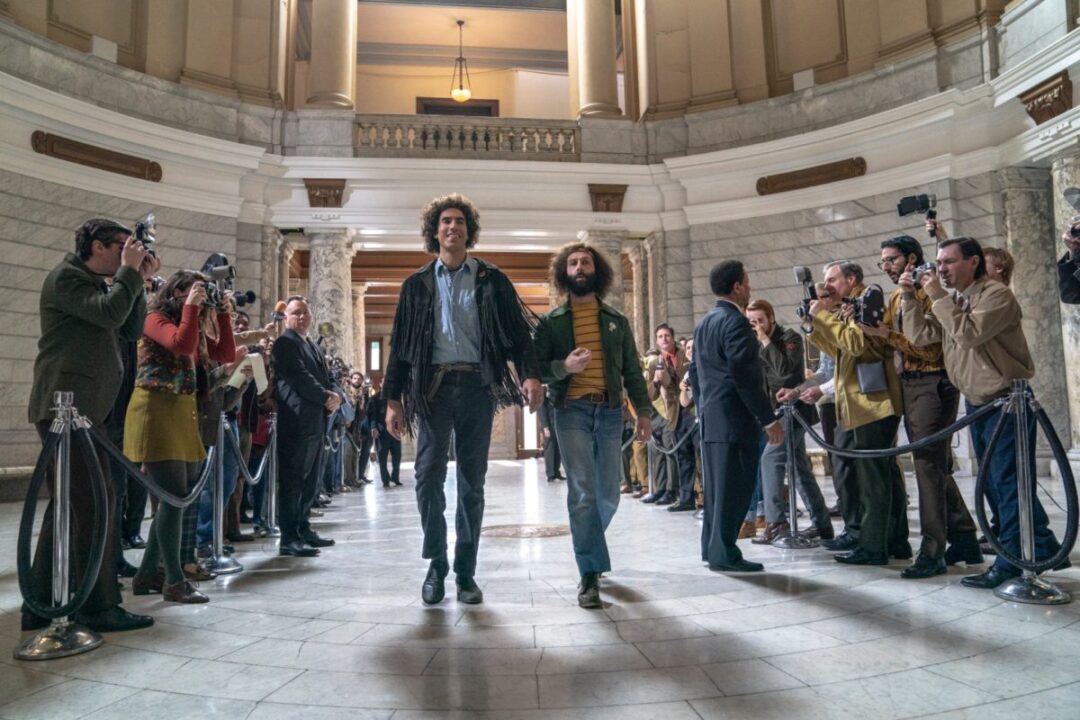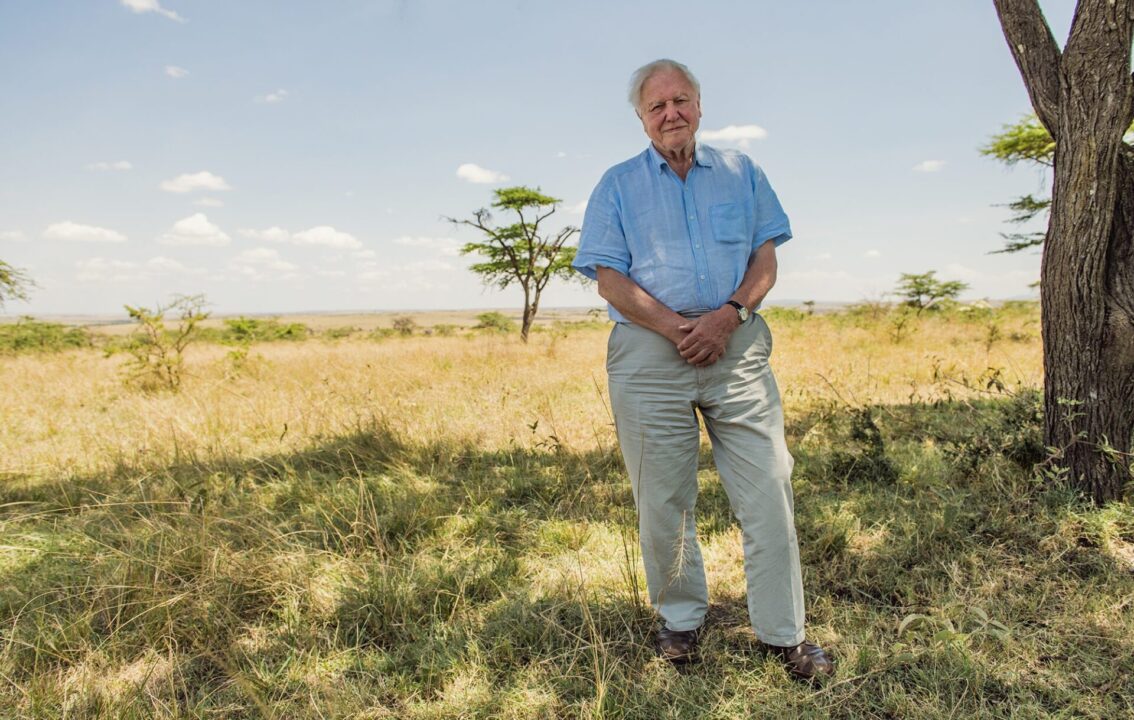Under the Influence of the High Priest of LSD, in 'My Psychedelic Love Story'
If there was ever a documentarian to skillfully capture the complex nuances of his subject, especially one who's lived a hard and fast life shrouded in mystery (and drugs), that would be Errol Morris. His latest film, My Psychedelic Love Story, is a mesmerizing oral history of sorts about Harvard psychologist and LSD's most notorious proponent, Timothy Leary. If you were a progressive hippie in the 60s, you idolized this man. If you were Richard Nixon, you'd do whatever it takes to restrain him and his drug-encouraging tendencies.
Leary, often referred to as the "High Priest of LSD," inspired millions of young people to take the drug to expand their minds and was seen as the counterculture's hero. After successfully evading authorities by sneaky international travels with his then-girlfriend, Joanna Harcourt-Smith, Leary was eventually captured by the FBI in the early 70s on drug conviction charges. However, in a strange turn of events, he agreed to be a government informant to shorten his prison sentence, a decision that still puzzles many to this day.
Leary's former partner in crime, Harcourt-Smith, is the sole narrator in My Psychedelic Love Story, giving us a colorful depiction of her time living, loving, and tripping with Timothy Leary. She talks directly to Morris throughout the film, answering his pointed questions about the enigma that was Mr. Leary.
Harcourt-Smith is an interesting person on her own; a Parisian socialite, she was a promiscuous psychedelic activist who can carry a story, however, at times it's hard to keep the narrative straight. Perhaps those already familiar with Leary's story will have an easier time remembering all the names, places, and events, as I, admittedly, started to zone out a bit. Disclaimer: I was watching this completely sober, probably against Leary's wishes.
It's high time a documentary was made about LSD's most notorious proponent, and Errol Morris delivers in both style and substance. Following his previous successes Gates of Heaven and The Thin Blue Line, Morris adds another substantial cultural relic to his filmography with My Psychedelic Love Story.
'My Psychedelic Love Story' is available to stream this Sunday on Showtime.
'Stardust' Reflection: Would Having An Alter Ego Help Me Live Confidently?
I have a slight obsession with David Bowie. If you know me (or happen to have seen me on a dating app that I won't name here), you already know this. "Rebel Rebel" has become my own personal anthem, reminding me to stay authentic in my unique wants and needs, especially when it seems like I'm marching to the beat of my own drum.
Out of all the rock stars that shot to stardom in the 1970s, Bowie inspired me most. Born David Jones, Bowie wasn't always this unabashedly confident. With help from his androgynous and flamboyant alter ego Ziggy Stardust (and later, Aladdin Sane and The Thin White Duke), he went on to create not only some of the most prolific records of all time but also empowered the use of on-stage personas to live boldly.
That's why it pains me to say that the new Bowie biopic Stardust, directed by Gabriel Range, offers only a lukewarm glimpse at the early life of this extraordinary, complex artist. (To be fair, it's hard to capture the historical rise of Ziggy Stardust in 109 minutes, and nearly impossible to execute it successfully without including a single David Bowie song. What made Bohemian Rhapsody and Rocketman mainstream hits was the fact that they actually played the hits, literally. More on that here.)
https://www.youtube.com/watch?v=eVWizSmWFzg&ab_channel=IGN
But even though Stardust isn't the praiseworthy nod to an icon that I hoped it would be, it gave me the opportunity to meditate on the many masks we all wear in different aspects of our life, and specifically the question: would having an "alter ego" help me to live more confidently?
"People don't want records that make them think," says one music businessman to a 24-year-old Bowie (Johnny Flynn) in one of the film's early scenes. Haphazardly embarking on a tumultuous U.S. tour to promote his latest record, "The Man Who Sold the World," Bowie never tries to fit his eccentric-ness into any box, let alone abide by rigid American standards. Much to the frustration of Mercury Records publicist Rob Oberman (Marc Maron), Bowie publicly flaunts his admiration for women's clothes, sexual freedom, and living unapologetically. Even as an unknown musician at the time, he didn't let his insecurity and differentness hold him back.
Reinventing himself as Ziggy Stardust gave him the platform to be someone else. Ziggy wasn't someone whose chaotic family life and history of mental illness felt like baggage. Ziggy wasn't a poor bloke from Brixton, London, dealing with the madness of being a struggling musician. Ziggy Stardust was already a superstar.
This is, to me, what makes David Bowie one of the greatest cultural icons of all time. He normalized the alter-ego to make artistic expression easier. Through the creation of Ziggy Stardust, David Bowie proved that we are in control of our own success. We are the only ones with the power to live our lives as boldly as we want to. The only thing most of us lack is the confidence to unleash it.
'Hillbilly Elegy' Reflection: When Is It Okay to Disappoint Your Parents?
Based on the 2016 memoir written by J.D. Vance, Hillbilly Elegy has all of the traditional markings of an Academy Award contender: an American "rags-to-riches" adaptation told through voice-over and flashbacks; directed by Academy favorite Ron Howard; and starring a nearly unrecognizable Glenn Close (who will most likely be receiving her eighth Oscar nom). To be frank, this formula should have been a shoo-in, especially after Green Book (somehow) won Best Picture in 2019.
If I were setting out to write a more critical review, I could boil my thoughts on this latest Netflix release down to a single word: Skip. And while it's easy to dismiss a film that delivers a hollow execution of "poverty porn," and misses the mark on examining true human depth, I want to talk about what Hillbilly Elegy does offer: a reflection on generational disappointment, and when it might actually be okay to ignore our programmed beliefs to unconditionally appease our parents (sorry, Mom).
J.D. Vance (Gabriel Basso) is a diamond in the rough–a smart kid who attends Yale Law School and holds a steady relationship with his equally ambitious girlfriend, Usha (Freida Pinto).
The only male in a family full of women, J.D.'s masculinity has always been called upon in times of need. His mother, Bev (Amy Adams), is an emotionally abusive drug addict who seems to confuse motherhood with a live-in rescuer, as she turns to J.D. to consistently bail her out of tough situations. J.D.'s grandma–whom he affectionately calls Mamaw (Glenn Close)–steps in as his guardian, her disappointment in Bev's absence made clear. Time and time again, J.D. is compelled to save his mother from herself, but his lack of seeing her as her own person–and not his responsibility–isn't just hurting her recovery, it's holding him back as well.
As children, we're taught to respect authority. In a perfect world, we would never have a reason to second-guess the words and actions of those who raised us. However, just because someone has the title of "parent," doesn't mean they are immune from giving bad advice, deploying manipulative tactics, and acting in selfish ways. Add "drug addict" to the innate fallibility of being a human being, and what we can get from a parent is indeed a deeply flawed individual. The hardest part for any person–let alone a child–is realizing that you are allowed to disagree with and disappoint those that don't serve you and your needs; even if you are bonded by blood.
Addiction is a selfish disease, as it affects both the addict and their families. J.D. is so afraid of upsetting his mother that he almost risks the opportunity to advance in his own law career, better his own life, and break out of the cyclical trauma. Consciously or not, by Bev relying on J.D. to save her time and time again, she is keeping him trapped in the endless cycle of despair. She knows their bond as mother and son is irreplaceable, and uses his sympathy to her advantage.
Through flashbacks, we also see that Mamaw was physically and emotionally abusive throughout Bev's childhood. Anger, despair, and disappointment have been passed down through multiple generations and unless J.D. is strong enough to reject this behavior, the pattern will continue.
It's not easy to go against a parent's wishes. Like me, I'm sure there have been plenty of times that you've done something that your parents weren't too thrilled about. Various high school moments come to mind, but those stories are for other times. And while it is perfectly acceptable and normal to have differences, what Hillbilly Elegy reminds us is that we can have love for someone without giving up our own lives in order to please them.
We’ve Got Your Exclusive Trailer Premiere: '32 Weeks'
Drawing parallels to Charlie Kaufman and Michel Gondry's Eternal Sunshine of the Spotless Mind, writer-director Brian Cavallaro's 32 Weeks explores the effects of memory, love, and loss. After a car accident leaves a young woman (Nicole Souza) with amnesia, she is torn between the new man in her life that she can't remember and her ex who she can't forget.
After its world premiere at the Fort Lauderdale International Film Festival and screening at the Rome International Film Festival, this indie darling will be available for all to enjoy next week.
Angelenos may recognize familiar locations in the trailer, as it was filmed entirely in Santa Monica, California. Comprised of a two-person crew and a micro-budget, 32 Weeks is truly an intimate portrayal of emotional abuse and pathological tendencies.
Indie Rights will release 32 Weeks on VOD and digital platforms on Tuesday, November 24.
https://vimeo.com/477259657/08ba6d299e
'Ammonite' Reflection: Would I Give Away My Heart For Temporary Love?
One of the most gut-wrenching moments in Luca Guadagnino's Call Me By Your Name is realizing there is an expiration date on Oliver and Elio's time together. Their relationship defied societal expectations, geographical borders, and yet, for as beautiful as it was, it couldn't stop time. Much like Ammonite.
It takes a lot of courage to be able to give your whole heart to a person, especially faced with an obstacle as monumental as distance (where handwritten letters are the only source of communication).
In Francis Lee's period drama, Ammonite–based on a true story–Mary Anning (Kate Winslet) and Charlotte Murchison (Saoirse Ronan) face a similar fate after falling into an unexpected love affair. But with a concrete end date in sight, I wonder if the eventual heartache is worth the temporary happiness?
We can't help who we fall for. Blame it on the pheromones, loneliness, what have you, we know that connecting with someone on a deep level doesn't happen too often.
The platonic relationship in Ammonite, between the seaside dwelling Mary–a renowned fossil hunter–and the married Mrs. Murchison turns into something more over the course of six weeks after which Charlotte is scheduled to return home to her husband and life in London. Mary and Charlotte throw caution to the wind as they get to know each other beyond guarded exteriors. Mutual stimulation, both mental and physical, draw them in like a moth to a flame, as if this is the first time they have been truly seen.
Almost immediately after the trailer for Ammonite dropped, it was being compared to Céline Sciamma's Portrait of a Lady on Fire, perhaps justifiably so. Both tell a fragile love story between two women and their attempts to conceal their growing relationship. Plus, we get more Victorian garb and mesmerizing beach scenes.
However, the major difference here is the basis of Ammonite's love story. There were a few times I was questioning if, given different circumstances, these women weren't just trying to make something fit into place to fill a void.
For Mary, Charlotte could be a distraction from her solitary lifestyle and sudden death of her mother. For Charlotte, who is outwardly reeling from residual trauma from the death of her only child, Mary could be another vessel in which to pour love into.
I don't doubt that what these women had wasn't love, and maybe modern dating has turned me into a little bit of a skeptic, but it feels to me that these women found a co-dependent relationship rather than a happily ever after.
Loving and losing someone is painful. Our heart is fragile and deserves to be given to someone who can properly care for it. And while love may look different for everyone, I think there is one thing that most of us can agree on: loving and losing is better than never having loved at all.
Distributed by NEON, Ammonite is now playing in select theaters, on-demand Friday, 12/4.
Bringing 'I Am Greta' To Life with Non-Binary Singers and Synths
How would you musically describe teenage climate activist Greta Thunberg and her message of ecological urgency? That was the challenge for the Swedish composer-duo Rebekka Karijord and Jon Ekstrand, who took this opportunity to create an unconventionally compelling, hybrid score for the intimate documentary, I Am Greta– streaming on Hulu this Friday.
To create this cinematic score, Karijord and Ekstrand were cautious not to sound too heavy or emotionally leading. Yes, the thought of the world crumbling from the effects of climate change is depressing and horrifying, but the music shouldn't necessarily contribute more somberness. In the end, with a blend of classical instrumentation and electroacoustic elements, the duo struck the right balance.
“With the music for I Am Greta, we aimed to find a sonic counterpoint to the friction between the shy, contemplative inner world of Greta, and the unbounded energy of the natural world and climate change movement... So, we choose to work with repetition and persistent musical patterns, often illustrated through energetic string arpeggios. This, we felt, helped underline the remarkable persistence and focus Greta has on the climate issue, as well as that of the relentlessness of nature.”
Combining a string octet, modular synthesizers, and a voice instrument (built by Rebekka) of 25 male, female, and non-binary singers from around the world in their full range is what brings this soundtrack to life. Listen to the track Tic Toc off of the forthcoming album below:
https://soundcloud.com/whitebearpr/tic-toc-from-i-am-greta-by-rebekka-karijord-jon-ekstrand/s-NN54VGBL4ju
The full soundtrack is available to stream now on the OONA Recordings website and on all streaming platforms, including Spotify.
I Am Greta tells the story of Thunberg through compelling, never-before-seen footage. Starting with her one-person school strike for climate justice outside the Swedish Parliament, Swedish director Nathan Grossman follows Greta - a shy student with Asperger’s - in her rise to prominence, and her galvanizing global impact as she sparks school strikes around the world. The film culminates with her astonishing wind-powered voyage across the Atlantic Ocean to speak at the UN Climate Action Summit in New York City.
In 'The Trial Of The Chicago 7,' Sorkin's Starry Cast Fights Back
In 1968, a mass of counterculture activists spearheaded a massive protest in Chicago’s Grant Park, hoping to draw attention away from the Democratic National Convention and onto their anti-Vietnam War demonstration. To say their plan succeeded, is an understatement.
All eyes were on the "Chicago 7," after the protest sparked a riot between police and protestors, overtaking the city and leading to political unrest (sound familiar?). Charged with criminal conspiracy and crossing state lines to incite a riot, the seven men and the trial that followed became one of the most infamous events in history. And with The Trial Of The Chicago 7 (on Netflix tomorrow), the story comes to audiences by way of Mr. Courtroom Drama himself: Aaron Sorkin.
Acclaimed for his Oscar-winning screenwriting but here directing his second film, Sorkin assembles a top-notch cast of actors, including Eddie Redmayne, Sacha Baron Cohen, Jeremy Strong, Frank Langella, and Joseph Gordon-Levitt, plus short but sweet appearances by Kelvin Harrison Jr, and Michael Keaton, to name a few. To be expected in any Sorkin work, there is a lot going on here: from fast-paced dialogue to quick cuts that jump between archival footage and reenactments, The Trial Of The Chicago 7 is sealed with the stamp of Sorkin. If you love his previous work, I won't have to sell you on this film. I know you'll watch it anyway.
A line that's repeated throughout the film is the protestor's battle cry "The whole world is watching!" That was true in 1969, and it's still true today. Here we are, in 2020, reliving eerily similar scenarios of unlawful police brutality, peaceful demonstrations turned into aggressive brawls, and a legal system than runs on bias (conscious or unconscious).
Sorkin said it himself at Tuesday's drive-in screening I attended at the Rose Bowl: "This film will upset you. Anger you. But above all else, it will inspire you." It's no coincidence that the film's release is just weeks before the most important Presidential election of our lives yet, and if there is one takeaway from The Trial of the Chicago 7, it's this: every voice in our country matters, and has the potential to change the world–even it starts as just seven.
Distributed by Netflix, 'The Trial of the Chicago 7' is streaming on Netflix this Friday, October 16, 2020.
We All Need To Listen to David Attenborough–Our Future Depends On It: 'A Life on Our Planet' Explains
One of my most treasured items of clothing I own is a thin white t-shirt with the name "Sir David Attenborough," in all capital letters, plastered across the chest. I bought it second hand from a sustainable fashion brand, something I think Sir Attenborough would approve of. Not only is this shirt one of the softest tops I've ever worn (and a casual flex for fellow nature film nerds), it is a statement that says I love our planet, I believe in science, and when a worldwide hero and qualified leader tells us we're in trouble, I listen.
His voice his iconic. His message is clear: climate change is ruining our beautiful planet. 94-year-old David Attenborough has dedicated his entire life to studying and protecting the natural world, and he describes many life-changing moments in the Netflix documentary A Life on Our Planet, directed by Alastair Fothergill and Jonathan Hughes. The places he visited as a young twenty-something that were once abundantly filled with luscious jungles, ice-capped mountains, and free-roaming wildlife, has become more skeletal every day. This visibly drastic difference is enough to bring a grown man, and definitely a 30-something film critic, to tears.
If seeing the distress on the faces of the displaced chimpanzees or the horrid conditions of factory-farmed chickens don't convince you to think twice about our role on this planet, then maybe Attenborough's desperate pleas will. "We're not apart of nature, but a part of it," or "We need more than intelligence, we need wisdom." But it's not all doom and gloom; Sir David Attenborough is confident that by following his calls to action, we can slow, stop, and then reverse the damage we're doing to our planet, starting with choosing solar over fossil fuel, reducing farm space to let the natural land grow, and incorporating more plant-based meals into our diets.
Attenborough attests that this film is his witness statement and vision for the future. We are so lucky to have him exist in our lifetime and share his knowledge with us. Increased awareness of climate change and sustainability will hopefully inspire future Attenboroughs, so let's do our part to cultivate an environment for them to thrive and carry on the message of our planet's hero.
Distributed by Netflix, 'David Attenborough: A Life on Our Planet' is now streaming on Netflix.

